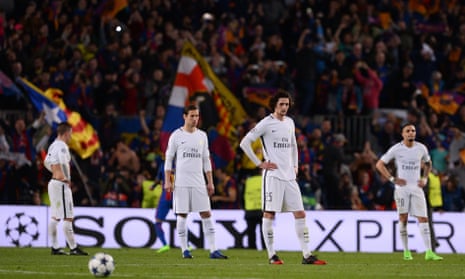What jolly scenes those were in the Stade de France last week as Les Bleus’ World Cup-winning squad and 80,000 fans serenaded N’Golo Kanté, football’s most self-effacing superstar and, apparently, its most adorable card cheat. Yes, it’s been all whoops and giggles in France since Didier Deschamps’ team added a second gold star to the nation’s shirt this summer. But the return of the Champions League this week is a reminder of a sorrier facet of the country’s football history – its incorrigible haplessness in European club competition.
As Paris Saint-Germain visit Liverpool and Lyon head to Manchester City, they will carry with them tales of bad luck, systemic imbalances and plain old bottling it, which explain why only one of 63 previous editions of the European Cup/Champions League has concluded with a French team winningthe darned thing. And that sole win was funky in the sense of foul-smelling, since Marseille beat Milan in 1993 only after easing their preparations by bribing players from Valenciennes, the opposition in their last domestic game before the final. Marseille were stripped of the Ligue 1 title for that caper but allowed to keep their European honour. So although France languishes far behind Portugal and the Netherlands – let alone Germany, Italy, England and Spain – it can at least claim as many European club champions as Romania and Scotland. Mais oui.
When the French sports journalists Gabriel Hanot and Jacques Ferran proposed introducing a pan-European club tournament in 1954 they no doubt hoped the trophy would find its way back to their homeland at least a couple of times over the following century. So far, so many near misses, and outright flops.
Right from the start the tournament became a gigantic tease for French clubs. Stade de Reims went into the first edition with high hopes, especially as England’s far-sighted Football League Management Committee prevented Chelsea from taking part on the grounds that the enterprise was “something of a joke and, at best, a nine days’ wonder”. Aberdeen also opted out so Scotland were represented by Hibernian, one of the teams beaten by Reims as the French champions swept into the 1956 final, handily staged in Paris.
Reims were funded by champagne tycoons and played with a classy style naturally dubbed “champagne football”. But in the buildup to the final against Real Madrid they lost two key players to injury – Armand Penverne and Raymond Cicci – and then encountered a problem that would become a recurring one for French clubs. Their best player, Raymond Kopa, had been bought by the opposition.
Kopa still played for Reims in Paris but his transfer to Madrid had been announced and he had even appeared for the Spanish club in a friendly against Vasco da Gama the week before the final. Undaunted, Reims raced into a two-goal lead and nearly made it 3-0 only for a close-range volley by Kopa to be blocked by the arm of Real’s defender Marquitos. “I think that would have clinched it,” Kopa said. Instead Marquitos roved downfield in the way his grandson Marcos Alonso now does for Chelsea, setting up a goal and scoring another to help Real win 4-3.
Reims met Real again in the 1959 final. The French side were spearheaded by Kopa’s replacement, Just Fontaine, who had been bought thanks to an actual hat-trick by Reims’ 36-year-old manager, Albert Batteux. (“To conclude my transfer from Nice to Reims, [Batteux] met me wearing a trilby and it gave him a very distinguished appearance,” Fontaine told L’Humanité in 2006. “He later conceded he had used it to make him look older, and he never wore it again.”) Despite the presence of Fontaine, who in 1958 set a World Cup goalscoring record that still stands, Real beat Reims 2-0.
Not until 1976 did another French club reach the final, whereupon Saint-Étienne lost to Bayern Munich partly because of another spate of injuries – and Hampden Park’s square goalposts.
After Dominique Bathenay and Jacques Santini had first-half shots rebound out off the crossbar before Bayern scored the only goal of the game, the theory took root that Sainté would have won if the bar had been round as most were. The French magazine So Foot hired scientists to prove that the ball would indeed have continued into the net if round rather than square goalposts (which would be banned by Fifa in 1987) had been used. The Scottish posts occupy such an infamous place in French football history that Saint-Étienne paid €20,000 to buy them in 2013 for display in the club museum.
Marseille had no such excuse after the 1991 final, although some decried the approach of their opponents, Red Star Belgrade, who played for a penalty shootout from the start and secured a 0-0 draw before prevailing on spot-kicks. But that was no justification for Marseille’s skullduggery two years later.
European football then became increasingly skewed by the financial power of the few, so it was some feat for Monaco to reach the 2004 final. But they ran into José Mourinho’s Porto and fell apart after falling behind. “Everything unravelled after the first goal,” said the Monaco midfielder Édouard Cissé of Monaco’shis team’s 3-0 defeat.
No French team have been back to the final since then. PSG and Lyon have had opportunities but been undone by that familiar duo – misfortune and Monsieur Bungle. Gérard Houllier’s Lyon choked after being in charge against Milan in the 2006 quarter-final. And PSG, since being pumped up by Qatari wealth, self-destructed tactically against Manchester City in a 2016 quarter-final before collapsing spectacularly, albeit amid woeful refereeing, against Barcelona a year later in the round of 16.
Lyon could cause upsets this season but probably do not have the means to triumph. PSG do. It will be fun to see whether they can write a glorious fresh chapter in French football history or find a new way of repeating the same old story.

